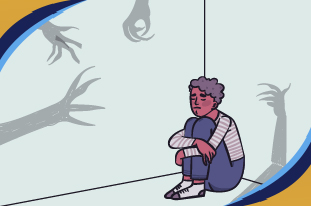Dear men, if you feel like you are feeling extreme bouts of different types of moods then you are probably suffering from bipolar disorder. Bipolar disorder in men is a pressing matter but somehow is glossed over due to idiotic reasons as it goes unrecognized and the disorder itself undiagnosed. So if you happen to see bipolar symptoms in men you know or if you are one yourself, it is time to get suitable treatment but before we do that, let’s get a comprehensive introduction to the definition of bipolar disorder and also talk about how it affects men and how can it be identified if they have it or not.
What is Bipolar Disorder?
It is a type of mental condition where two types of moods reign. These moods are the opposite side of the spectrum and each of these moods has episodes that characterize different types of bipolar disorders. The episodes can either be manic or depressive. The manic side of things suggests feelings of hyperactivity, over excitement, and uber-happiness while the depressive episode is more concerned with feelings of extreme sadness, impulsivity, and irritability. The back and forth between these extreme and opposite moods is a hindrance for those who are affected by this type of mental condition.
The Different Types of Bipolar Disorders
The different types of bipolar disorder can shed light on the different signs of bipolar disorder in men.
Bipolar 1
You may have Bipolar 1 if you have had a manic episode at least once and it has lasted for at least a week. While it is not always the case, people who have bipolar 1 also tend to suffer from depressive episodes
Bipolar 2
You are bound to get the diagnosis of Bipolar 2 if you have suffered from at least one depressive episode and a manic episode that has at least for four days.
Cyclothymia
If you have been having alternating mood swings for a period of over two years and your symptoms do not match the criteria of either bipolar 1 or bipolar 2 then you are probably suffering from cyclothymia. It is difficult to diagnose this one as the symptoms may not seem serious enough to warrant a treatment but this ailment is indeed a serious matter.
Rapid-Cycling Bipolar
When it comes to bipolar disorder in men, this type is the least relatable for them because it is prevalent in women. You will be told that you have either bipolar 1 or bipolar 2 with ‘rapid cycling’. This one is characterized by depressive, manic, or a combination of both of these episodes that have happened at least 4 times in under a year. It usually goes like this, one manic or hypomanic episode that is followed by depressive ones. Rapid cycling alternates between normalcy that can last for weeks and sometimes episodes that go on for weeks or even months
How Bipolar Disorder Differs in Men?
Bipolar disorder in men can exist differently than it does in women. There are a couple of ways it differs from that. Let’s see how:

The Onset
The bipolar symptoms in men appear earlier when compared to women. Women also tend to get a seasonal pattern and their mood swings are more extreme than in men.
The Prevalence of Episodes
Men tend to have fewer depressive episodes and mix mania than women. As mentioned before, rapid cycling of these episodes is more common in women than men.
The Type of Bipolar Disorder
Bipolar 2 is more prevalent in women than in men and that reiterates the fact men tend to suffer from fewer depressive episodes.
Co-occurrence
Substance abuse with bipolar disorder in men is more common while it is uncommon for men to have bipolar disorder with mental conditions such as an anxiety disorder like Obsessive-Compulsive Disorder (OCD).
Hormonal Effect
Signs of bipolar disorder in men are also different due to the different levels of hormonal influences that exist in men and women. In women, hormonal fluctuations that arise because of menopause, pregnancy, or the menstrual cycles, all of which are not present in men, can alleviate bipolar symptoms in women to extreme levels.
Decoding Bipolar Symptoms in Men
Identifying bipolar signs in males is not akin to finding the root from where the problems stem but is more similar to finding the connecting dots that lead to that root. Bipolar disorder in men is characterized by impulsive behavior as men with bipolar are more prone to aggressive outbursts, risk aversion, and increased irritability. This heightened irritability and anger occur more during the manic phases of men, which can hurt their relationships and the social circles they frequent. The effect is similar in the depressive episodes, while women feel sadder during these episodes. Women with bipolar may feel more suicidal thoughts but it is the men with bipolar who actually commit suicide more, which is especially evident when signs of bipolar depression in males are present.
Causes of Bipolar Disorder in Men
The actual cause of bipolar disorder in men is known, but if we really had to pinpoint it, we can say it is a combination of different variables that lead to bipolar disorder in men. But predominantly these variables or a mix of them probably cause bipolar disorder.
Genetics:
Bipolar disorder in men is meant to happen if there is a long family history of affliction. This suggests that there is a genetic link and therefore predisposition in bipolar disorder’s prevalence in people whose ancestors tend to have it. This way bipolar disorder does not discriminate in any way.
Environment:
The genetic link is what puts bipolar disorder in the genetic code but it is not what actually initially triggers it. Situations that involve stress, trauma, hormonal imbalances, or substance abuse can act as triggers that lead to bipolar disorder in men, women, or even adolescents and children.
Chemical Imbalance
When chemical messengers like serotonin, dopamine, and epinephrine or their operations are compromised, it can also lead to signs of bipolar depression in men and women.
Hormonal Dysregulation
While more common in women due to issues related to pregnancy, menopause or mensuration, it can happen in men too. For example, taking hormonal therapy for one reason or another, or somehow having a deficiency related to it, can lead to bipolar disorder in men.
Brain Structure
How your brain is structured can also lead to bipolar disorder in men. For example, the size of the prefrontal cortex, a part that is associated with feelings and mood, can literally affect if you are going to get bipolar disorder or not. Again, what size your brain is does discriminate when it comes to gender.
How to Deal With Bipolar Disorder in Men?
Bipolar signs in males tend to go unreported because men tend to avoid coming to terms with the idea that they might be suffering from bipolar disorder, or in fact any mental condition for that matter. This is because society expects men to not resolve their mental conditions, especially the ones that relate to emotions, which bipolar disorder is. The problems with anger and impulsivity that can arise due to bipolar disorder in men are often regarded as “boyish” behavior or symptoms of another issue, which frequently leads to a bipolar misdiagnosis. The only clear way to heal from bipolar symptoms in men is to find treatment and understand that these symptoms are serious and can be consequential if left untreated.
Treatment
Treatment of bipolar disorder in men does not differ much when compared to treatment for women with bipolar. But a combination of the treatment methods referred to below can cover all the bases that can help you heal from bipolar symptoms.
Medication
A carefully reviewed and monitored concoction of antipsychotics, antidepressants, and mood stabilizers can take up the fight against bipolar symptoms in men.
Psychotherapy
Also called “Talk Therapy”, is very beneficial in treating bipolar disorder in men. A therapist who is an expert in bipolar disorder can help with navigating through the extreme mood swings and the problematic behavior that is caused by them
Electroconvulsive Therapy (ECT)
The “electric shock” therapy is used for treating the extreme or severe form of bipolar disorder.
Concluding Words
We have talked about the signs of bipolar disorder in men and how it can be treated, its causes, and of course the symptoms. But did we tell you we have an expert team of mental health professionals at Orange Coast Psychiatry, that is more than capable of handling mood disorders such as bipolar disorder? So now that you know, why not book an appointment?
























